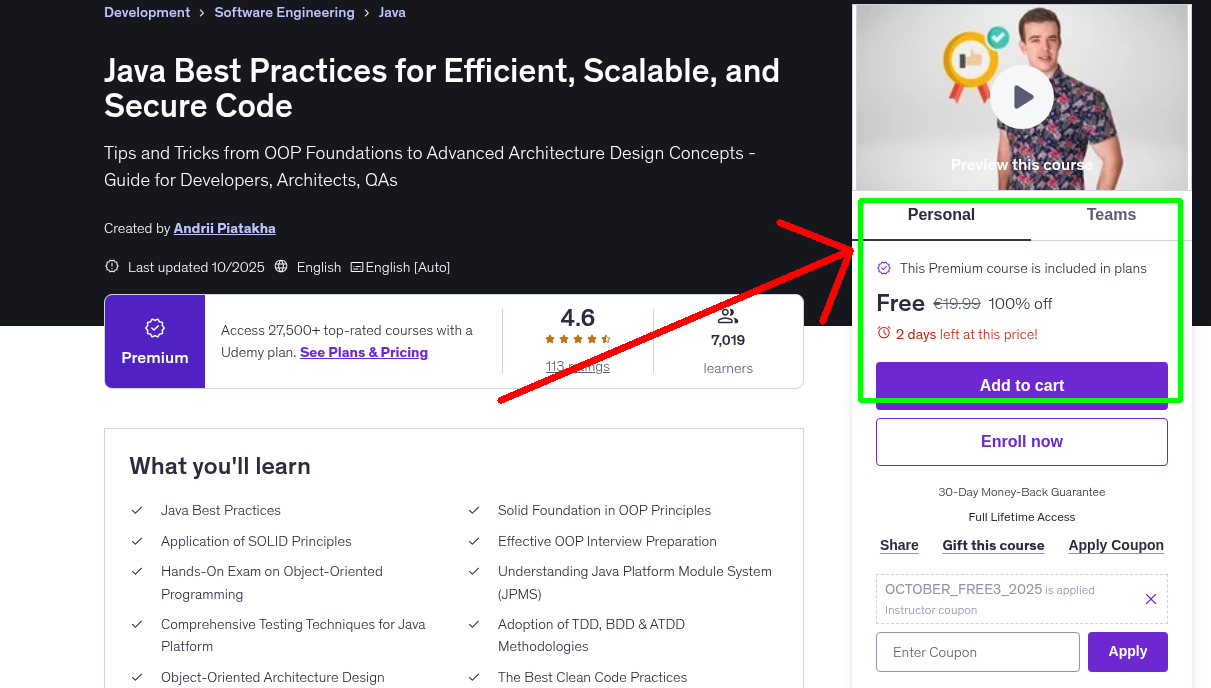
What You'll Learn
- Java Best Practices
- Solid Foundation in OOP Principles
- Application of SOLID Principles
- Effective OOP Interview Preparation
- Hands-On Exam on Object-Oriented Programming
- Understanding Java Platform Module System (JPMS)
- Comprehensive Testing Techniques for Java Platform
- Adoption of TDD, BDD & ATDD Methodologies
- Object-Oriented Architecture Design
- The Best Clean Code Practices
- Application of GoF Design Patterns
- Preparation for Design Patterns Interviews
- Stay Updated with Java New Versions
- Effective Logging Practices in Java
- Java Secure Coding Practices
- Designing RESTful Architectures
- Understanding Software Development Metrics and KPIs
- Web Application Design Patterns
Requirements
- Basic Java Knowledge: A fundamental understanding of Java programming is essential. Students should be familiar with Java syntax, data types, control structures, and basic concepts.
- Programming Experience: Participants should have prior experience in writing Java code. Familiarity with coding practices and basic software development concepts is advantageous.
- Development Environment Setup: Students should have a working Java development environment set up on their machines. This includes the Java Development Kit (JDK), Integrated Development Environment (IDE) like IntelliJ or Eclipse, and a version control system (e.g., Git).
- Familiarity with Version Control: Some familiarity with version control systems, particularly Git, is recommended. This knowledge will aid in collaborative coding practices and project management.
- Motivation for Best Practices: An eagerness to learn and apply best practices in Java development is crucial. The course emphasizes industry-standard approaches to writing efficient, maintainable, and secure code.
Who This Course is For
- Java Developers: Intermediate and experienced Java developers looking to enhance their skills and adopt industry best practices in Java programming.
- Java Enthusiasts and Students: Students and enthusiasts who want to build a strong foundation in Java programming and gain insights into industry-standard practices.
- Technical Leads and Architects: Technical leads and architects aiming to reinforce their understanding of Java best practices for designing scalable and maintainable software architectures.
- QA Engineers: QA professionals aiming to understand Java best practices to enhance the quality and efficiency of their testing efforts.
- QA Automation Engineers: Individuals involved in QA automation who want to improve their Java programming skills and incorporate best practices into their automated testing frameworks.
- QA Leads and Managers: QA leads and managers seeking insights into Java best practices to guide their teams in implementing effective and maintainable testing strategies.
Your Instructor
Andrii Piatakha
Founder and CEO in IT-Bulls, Founder of Learn-IT University
4.4 Instructor Rating
49,574 Reviews
1,179,427 Students
73 Courses
Never Miss a Coupon!
Subscribe to our newsletter to get daily updates on the latest free courses.



